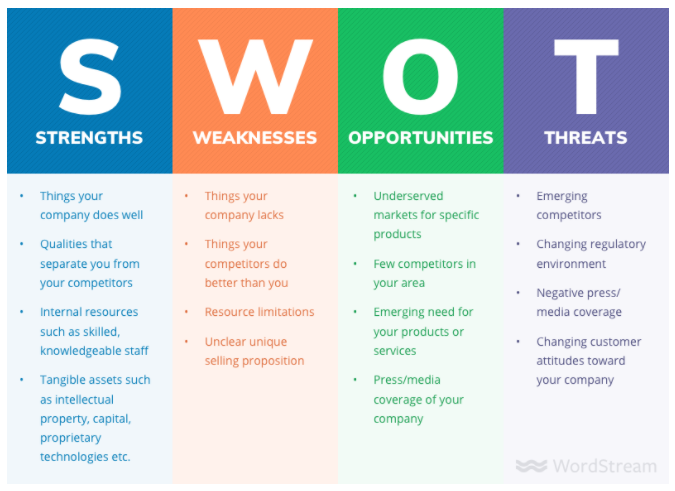If your startup company has already launched and you don’t have a concrete marketing strategy, you’re behind. Some of you may have created a marketing strategy before your company launched. Your marketing strategy can make or break your business. You need to find ways to segment your target audience to help you identify the best market for your brand: This chart is a great reference to give you ideas when it comes to getting as much information as possible about your prospective market. One the one hand, a narrow target marketing will make it easier for you to make your brand appealing to that specific group of people. Conduct market research Now that you’ve identified your target market, it’s time to start coming up with promotional strategies, right? That’s why earlier I said you should be creating a marketing strategy before your startup launches. Figure out what type of content you’ll publish Again, this relates back to some of the earlier points in this post: identifying your target market, conducting market research, and analyzing your competitors. If things didn’t go as planned, you can try a new strategy at that time. What marketing strategy is your startup company using to reach your target audience?
Starting a business is no easy task. Trust me, I know this very well from my experiences founding multiple companies.
If you are currently building a startup company, kudos to you for the effort.
There is a long and difficult road ahead of you. But if you start with the right foundation, this road can be very rewarding.
If your startup company has already launched and you don’t have a concrete marketing strategy, you’re behind. To be as effective as possible, your strategy should be created in the early stages so you’re ready to go once the company officially launches.
That said, you can’t go back in time. So don’t be alarmed. It’s not too late for you to build a strong marketing plan.
Some of you may have created a marketing strategy before your company launched. That’s great. But now that you’re in business, you are quickly realizing your strategy isn’t working the way you thought it would.
It’s time to go back to the drawing board.
Regardless of your unique scenario, I’m confident this guide can help steer you in the right direction. It can also be used as a reference for prospective startup founders in the preliminary stages of writing a business plan for your new company.
Your marketing strategy can make or break your business. It’s important you spend the time to get it right as soon as possible.
Here’s what you need to know.
Identify your target market
Before you do anything else, you need to decide to whom you are going to sell your products or services.
All too often in my consulting work, I see many new business owners who skip over this step because they believe their brands are for everyone. While I admire their ambition, that’s simply not the case.
You need to find ways to segment your target audience to help you identify the best market for your brand:

This chart is a great reference to give you ideas when it comes to getting as much information as possible about your prospective market.
You can also use generational marketing to segment your target audience.
Start broad and slowly get more specific. Depending on your brand, you may be targeting a wide range of individuals.
For example, let’s say your company sells clothing. You may sell clothes to men, women, and children of all ages. How can you narrow that down?
Maybe you’re targeting people who will wear your clothing for physical activity and fitness. You could get even more specific and target a certain sport, such as running or cycling.
Develop a customer persona for each unique type of customer.
There is a science to this strategy. One the one hand, a narrow target marketing will make it easier for you to make your brand appealing to that specific group of people.
But on the other hand, going too specific with your campaigns will alienate a large portion of the total consumer market. Tread carefully here, and do your best to find a market within the middle ground.
Conduct market research
Now that you’ve identified your target market, it’s time to start coming up with promotional strategies, right? Not so fast.
Before you work on new advertising campaigns, you need to validate your hypothesis.
Just because your brand is planning to target a certain audience doesn’t mean this group of people will automatically accept you.
You need to get out there and find out whether your target market actually wants what you’re selling.
Here’s a look at the top reasons why startup companies don’t succeed:

The number one reason why startup companies fail is because there is no market need for what they offer.
That’s why earlier I said you should be creating a marketing strategy before your startup launches. Then, you’ll be able to find out early on during the market research phase whether your venture is worth pursuing.
If your brand created a new product or service, find out how it helps improve the lives of your target market:
- interview people
- conduct focus groups
- let them try out your product
- listen to their feedback
All of these are crucial to the market research process.
Not all of you are creating something unique. You may have just made improvements to an already existing product or service.
Well, what’s your differentiation strategy? What makes it better than the competition’s product?
Figure out how your brand compares to other similar products or services already on the market. This will make it easier for you to craft a marketing strategy.
Analyze your competition
Your startup company doesn’t exist in a vacuum. As I previously alluded to, you need to be aware of your competition within this space.
In most cases, your startup company isn’t 100% unique. It’s more than likely that whatever you’re selling is similar to other products and services on the market.
That’s OK because the right marketing strategy can help you survive even with lots of competition.
Analyzing your competition is one of the most crucial parts of your marketing strategy. Start by looking at their marketing campaigns.
A simple SWOT analysis chart can be a useful tool when it comes to your competitive analysis process:

That’s because this type of chart is designed to compare your competitors to your own brand.
What is their target market?
Figure out what’s working well for them. If a marketing strategy works well for your competitors, it might work for you as well.
If you notice flaws in their marketing strategy,…

COMMENTS